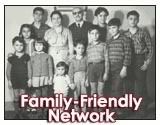Monday, February 26, 2007
Interview with John Aubrey Anderson
Today, I have the pleasure of speaking with John Aubrey Anderson, author of Abiding Darkness and Wedgewood Grey.
1. Can you tell us a little bit about you?
A “little bit” should cover it.
My wife and I live quiet lives. Before being propelled into writing, I spent thirty-five years flying airplanes—six years for the Air Force, twenty-nine for an airline. The pace of my life changed when I retired.
I’m a slow writer, so I spend most of my time working on “the next book”. Normally, I spend about eight to twelve hours a day—with gusts to twenty—writing or working on something book-related. My wife teaches an in-depth ladies Bible study, and that keeps her equally busy. We make time for social occasions a couple of times a week, and we spend time with out children and grandchildren. Very quiet lives.
2. How did you get started writing initially? Was Christian fiction your first attempt at publishing?
Christian fiction was my first and only attempt.
Twenty years ago, I read a book titled The Language of Love, by Gary Smalley. The author’s premise was: If you want someone to remember your point, tell them a story. Prompted by that book, I wrote our daughters a short story—a fictional illustration about the need to choose well.
Ten years ago I decided to modify that same little story and wrap it around the gospel. I started adding a little here and there . . . planning to give the finished product to a friend of ours (my one-person target audience).
Five years ago, I found myself surrounded by a few hundred thousand words and some thoughts of having them published.
Four years ago, I went to my first-ever writers’ conference (Mount Hermon) and met with my first-ever (and only-ever) editor.
The Black or White Chronicles were born out of my first meeting with that editor; he is now my good friend, and our wives think they’re sisters.
3. Do you write full-time, or do you have a full-time job outside of your writing?
Being fully retired diminishes my need for an appointment book, so unless a serious brushfire interrupts me, I write seven days a week. I can’t imagine getting this done while holding down a real job; I barely have time left over to brush my teeth.
4. Where do you get the inspiration for your stories?
I looked up “inspiration” and found synonyms like motivation, influence, originality, bright idea, and eureka moment; they didn’t help me with this answer.
I started writing Christian fiction because I wanted to wrap sleep-stealing suspense around a clear presentation of the gospel. My target audience expanded to become any self-confident type who would pass on a sermon but stop to read a riveting story. I broadened my target audience yet again to include Christians who like to read good suspense/thriller fiction but don’t want to dal with gratuitous profanity and steamy sex. God has given me readers from both sides of the line.
5. Who are your favorite authors?
I find it easier to name several my favorite books: A Time to Kill; The Client; The Lion, The Witch, and The Wardrobe; Watchers, by Koontz; and To Kill A Mockingbird.
I haven’t read a “new” book in years. I don’t want another author’s ideas coloring my thought processes, so I just keep rereading my old favorites.
6. I have found that some authors listen to music while they write. Do you listen to music or is it something that is distracting to you?
As I write this, Rockin’ Pneumonia and the Boogie Woogie Flu is playing on my computer.
I have about a hundred selections in a mix that shuffles while I’m writing; it ranges from light classical to CCR, C&W to hymns, sixties R&R to Amy Grant. Every now and then—usually if I’m working with something that needs tenderness—it’ll distract me, and I’ll back off to hymns or soft classical.
And going back to the inspiration question . . . the title (which I’m not sharing yet) for my fourth book was inspired by one of the songs on my playlist.
7. What are some of your hobbies besides writing?
At this point, any hobbies would be invasive. As I said earlier, I write long hours, and if I’m not writing, I want to spend time with my wife.
Golf interests me, and I have a 5-string banjo I’d like to learn to play, but for right now . . . I get satisfaction and pleasure from writing fiction that stops the hearts of its readers.
8. What can you tell us about your current release "Wedgewood Grey"?
Abiding Darkness took its time moving chronologically from 1945 to 1959. It introduced special people to us and set the stage for the coming novels. Wedgewood Grey moves faster; the biggest part covers a two-year time span. It gives us more action, more tension, a closer look at evil, and a couple of new characters.
9. What gave you the inspiration for the Black or White Chronicles?
Don’t tell anyone I did this, but I backed into it. I started with that little story for our girls and started backing up, a few years at a time, adding decades of backstory. What happened in the formation of the series is the aviation equivalent of tossing a bunch of people out of an airplane before starting to manufacture their parachutes.
10. How much of your own experiences influenced the characters of Mose Washington, Missy and the FBI agent? What aspects became traits that were theirs and theirs alone?
A reasonably significant part of what I write comes out of what I’ve lived—including the development of my characters. It makes sense that I’d know these people as well as I know myself . . . and it’s sometimes hard to tell where I stop and they start. In the past I’ve scoffed at comments by authors who said their characters took on lives of their own. I don’t scoff anymore. I’m not sure I can track the origin of their traits, but . . .
There are times when I just sit here and watch Missy be Missy . . . and smile.
And Mose has never been anything but a great man—a compilation of the old black gentlemen who lived near my early life. I feel as if I’ve known, admired, and respected the man all my life.
Every story needs a good, strong man. Jeff Wagner came on the scene to be that man for Wedgewood Grey, and he brought along everything but a purpose in life. I like him, and I think it shows.
11. What were your most difficult parts to write? Your favorite?
For me, all the parts are difficult.
I don’t want to waste a single word on the mundane . . . not a syllable. Getting my fiction to become my reader’s reality is a challenge—it ever will be. I told you earlier . . . I’m a slow writer . . . and I think slowly. I rewrite incessantly because I want the person who turns the pages of my books to rub shoulders with my characters. I want the story to sink its tentacles into my reader’s heart and refuse to turn him loose.
My favorite parts? All of them.
I like my stories. I like shaping them . . . crafting them to invade lives. I like knowing that I’m doing something that has the potential to make a difference for the cause of Christ. I thank God that He has let me be the one to tell people that He’s real . . . that He cares.
12. What themes exist in that you hope the reader sees? Are there any themes that weren't overt but developed as the story progressed?
My answer may be confusing because I’m more of a storyteller than I am a writer—if that makes sense . . . and I know next to nothing about the vernacular of writing.
The obvious centerpiece in Wedgewood Grey is the price that was paid for our freedom. And the story shines sidelights on honor, courage, loyalty, and strength of character.
Going back to The Language of Love; it is my intent to showcase a doctrinal stance or defend an apologetic point in each book. The defense/showcase will be woven into the story in a way that fails to interrupt the suspense.
Lastly, and continually, I want my readers, regardless of which book they are reading, to be reminded that we are in the midst of a battle. Our lives are not about what happens to us . . . our lives are the product of our choices.
13. What can readers expect to see from you in the coming year?
And If I Die, Book Three of The Black or White Chronicles will publish in August of 2007. I haven’t figured out how to say much about any of the books without revealing things better kept concealed. Let me just say that our war with evil is ongoing . . . and someone has to take the point.
I’m finishing up the fourth book in the series (my wife’s favorite), but I don’t have a predicted release date for it.
14. Is there anything else you would like to share with us?
I’m confident that many of you pray on a regular basis. May I ask that you take a few short seconds and pray fervently for the effectiveness of my words?
And I would ask that you keep three all-important words about my writing at the forefront of your memory . . . God did this.
John, I cannot thank you enough for sharing time with us today, and I wish you success in your writing. We look forward to more of your remarkable works.








































